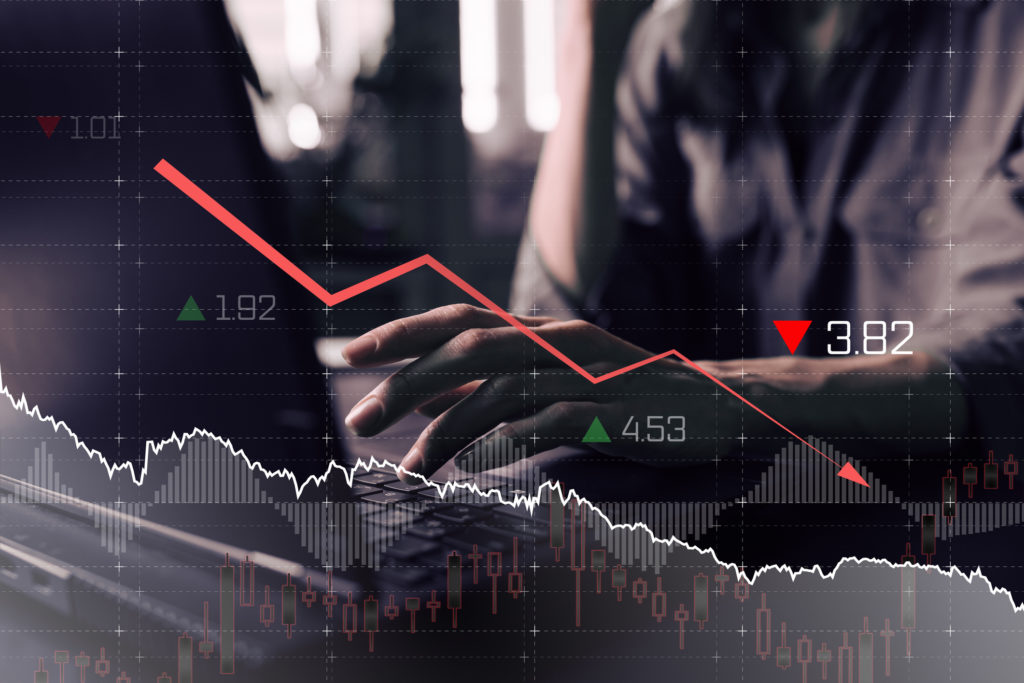The year 2008 proved emotionally exhausting for investors. Volatility rocked the markets causing the S&P to hit lows more than -17% by mid-July. Late summer brought a slight recovery and quieter conditions only to have the market plummet in October resulting in a new bottom of over -42%. Although these types of market conditions don’t happen regularly, they can really cause emotional turmoil for investors when they come to pass. Here’s what you need to know about riding out the storm and keeping your cool while investing during market volatility.

Don’t assume
Your portfolio is not “the market”. If you see that the S&P or the Dow Jones are down 2% in a day, it does not mean that you lost the same amount. Indexes can give you an idea of what is going on, but they are highly dependent on a few companies. For example, Apple currently makes up a whopping 6.59% of the S&P 500. If Apple moves significantly, the index is sure to be affected. Your portfolio, on the other hand, may not have any Apple in it. You also may have investments that are not in the S&P 500 at all. Your portfolio could include a mix of stocks, bonds, cash and even commodities such as precious metals. It’s best not to make any assumptions about what your portfolio is doing based upon what the indexes are doing. Instead, discuss your allocation and risk level with a trusted investment advisor regularly to determine what you should expect if markets move significantly.
Don’t make emotional decisions
We’ve all heard that you should buy low and sell high but making emotional decisions can cause investors to do just the opposite. Investors who panicked and sold out in October of 2008 most likely missed at least part of the recovery that followed in 2009 and 2010. Some investors who tried to jump back in at some point during the recovery re-entered the market at higher prices than they sold out at. Panicked investors aren’t the only investors to be affected by emotional investment mistakes. Bullish investors sometimes are quick to call the bottom of a market and may find that FOMO (fear of missing out) causes them to overpay or take unnecessary losses. It’s generally best to avoid jumping in and out and trying to time the market, when investing during market volatility.
Don’t overdo it on the withdrawals
If you are a retiree depending on your account for income, don’t panic. Your portfolio is likely designed to provide income from dividends and interest in addition to giving you the potential for modest growth. If you stick to your planned distribution, your portfolio should be able to weather the market volatility and still provide what you need. On the other hand, you may want to wait to take distributions for large purchases that require your securities to be sold at a loss in order raise enough cash to fund the purchase.
Do stay calm
If you feel emotional about money, it’s ok and it’s normal. We work hard for what we have saved, and it can make you very upset when you see losses during times of market volatility. You may feel better to know that the money it’s not been taken out of the account. In fact, when your investments go up, no one made a deposit. Investment gains and losses represent a change in the value of the shares you own. You do not own your balance. You own the shares in your portfolio. Sometimes your shares will be worth more than you paid, and sometimes, the value will be less than you paid. If you’ve been investing for a while, you probably have more money than what you’ve deposited from your own money. Investments never move upward in a straight line. They will move in both directions with a trend of moving upward over time. It’s a marathon, not a sprint.
Do keep focused on the long term
If you are a saver, these are great opportunities for adding to your long-term wealth. Now is not the time to stop saving. We want to buy low and market dips can offer us the opportunity to get the biggest bang for the investing buck. Our systematic savings buys more shares.
If you are retired and are taking money out instead of saving, you still need to be focused on the long term. A person who retires in their 60’s will weather three or four bear markets and many corrections during retirement. Just because you are retired does not mean that you have a short investment horizon. Someone retiring in their 60’s very well can have a 20–30-year investment horizon based upon life span.
Do seek advice on withdrawals, taxes, and security sales
Planning how you take money out of your portfolio is always important, but it’s especially important to be smart during down years. A trusted advisor can help set up your portfolio with cash and income like dividends and interest so you are not selling securities at a loss. There may also be certain securities that are up in value when the broad markets are down, which could be sold, if needed, to provide cash for a withdrawal. Your advisor can also give you a heads up about what to expect at tax time because sometimes investors are caught off guard by taxable events that happen even though portfolio values may be negative.
Do review your portfolio
You may be afraid to look when you are losing. By meeting with your advisor, you can get reassurance and insight about what is going on in the world and how it is affecting your nest egg. You may even find out that it’s not as bad as you thought. A good advisor will want to let you know what is happening and explain how your portfolio has responded to the market conditions. If you haven’t heard from your advisor, it may be time to consider finding another one.
Negative markets and statements with negative returns are scary. You may be feeling like you need to quick do something to stop the bleed, or you may feel emotionally defeated, but know that the market is bound to go up and down. Stay focused on your goals and rely on your trusted advisor to guide you toward your goals, especially when investing during times of market volatility.
 |
Rebecca AgamaiteInvestment Advisor Representative Rebecca joined the firm in 2011 as an Investment Advisor Representative. In this role, she works with clients to manage their investment assets and help them obtain their financial objectives. Rebecca brings a great deal of experience to the team having worked for several years at Marshall & IIsley Bank and MetLife. She earned a Masters of Business Administration degree (with an emphasis on finance) from Concordia University. |
Advisors Management Group, Inc. is a registered investment adviser whose principal office is located in Wisconsin. Opinions expressed are those of AMG and are subject to change, not guaranteed, and should not be considered recommendations to buy or sell any security. Past performance is no guarantee of future returns, and investing involves multiple risks, including, but not limited to, the risk of permanent losses. Please do not send orders via e-mail as they are not binding and cannot be acted upon. Please be advised it remains the responsibility of our clients to inform AMG of any changes in their investment objectives and/or financial situation. This commentary is limited to the dissemination of general information pertaining to AMG’s investment advisory/management services. Any subsequent, direct communication by AMG with a prospective client shall be conducted by a representative that is either registered or qualifies for an exemption or exclusion from registration in the state where the prospective client resides. A copy of our current written disclosure statement discussing our advisory services and fees continues to remain available for your review upon request.



